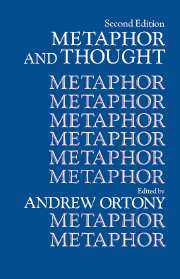Book contents
- Frontmatter
- Contents
- List of contributors
- Preface to the second edition
- Preface to the first edition
- 1 Metaphor, language, and thought
- METAPHOR AND MEANING
- METAPHOR AND REPRESENTATION
- METAPHOR AND UNDERSTANDING
- METAPHOR AND SCIENCE
- 20 The shift from metaphor to analogy in Western science
- 21 Metaphor and theory change: What is “metaphor” a metaphor for?
- 22 Metaphor in science
- 23 Metaphorical imprecision and the “top-down” research strategy
- METAPHOR AND EDUCATION
- References
- Author index
- Subject index
23 - Metaphorical imprecision and the “top-down” research strategy
Published online by Cambridge University Press: 05 June 2012
- Frontmatter
- Contents
- List of contributors
- Preface to the second edition
- Preface to the first edition
- 1 Metaphor, language, and thought
- METAPHOR AND MEANING
- METAPHOR AND REPRESENTATION
- METAPHOR AND UNDERSTANDING
- METAPHOR AND SCIENCE
- 20 The shift from metaphor to analogy in Western science
- 21 Metaphor and theory change: What is “metaphor” a metaphor for?
- 22 Metaphor in science
- 23 Metaphorical imprecision and the “top-down” research strategy
- METAPHOR AND EDUCATION
- References
- Author index
- Subject index
Summary
In discussing Boyd's interesting and provocative thesis concerning the role of metaphor in the development of scientific understanding, I shall focus on several issues which strike me as particularly relevant to the new discipline of cognitive science (which takes a computational approach to the study of cognition). In doing so, I shall occasionally adopt a translation of some of his terminology into terminology more familiar to me, thus perhaps exhibiting some metaphorical usage of my own.
The four main points that I shall address are the following. First, I suggest that important as it is, the accommodation of linguistic usage is only one part of the sort of accommodation of conceptual schemata that occurs in ontogenetic development, and which in my opinion, remains as deep a mystery as it was in Socrates' time. Second, as I wonder why I find some of Boyd's own metaphors enlightening without at the same time compelling me to accept some of his conclusions, I suggest that in cases where views differ, “aiming at” will not substitute for detailed argument. Third, since I find Boyd's discussion of imprecision to be particularly interesting, I try to relate this notion to my own bias concerning the utility of certain kinds of imprecision (referential, not logical) in the development of cognitive theory.
Information
- Type
- Chapter
- Information
- Metaphor and Thought , pp. 543 - 558Publisher: Cambridge University PressPrint publication year: 1993
Accessibility standard: Unknown
- 6
- Cited by
